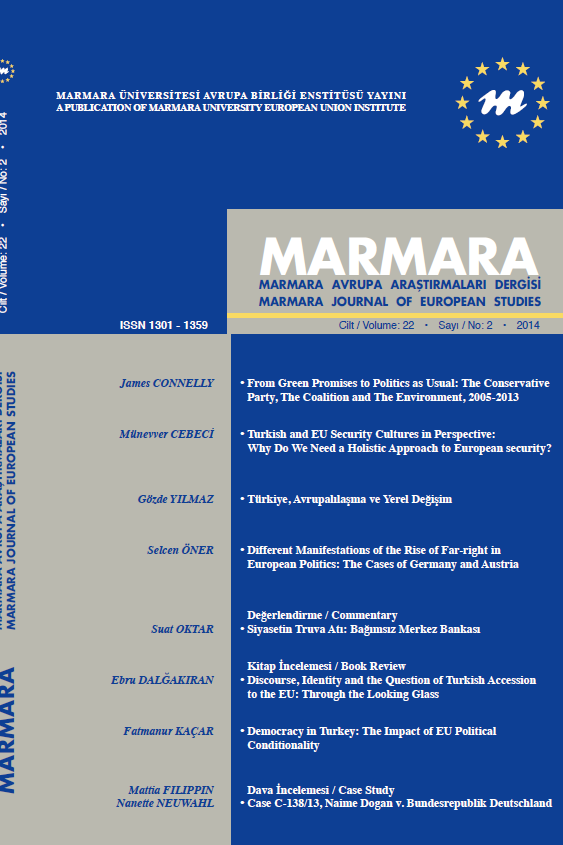IMMIGRATION POLICY-MAKING IN THE EUROPEAN UNION:A CASE STUDY ON THE ADOPTION OF DIRECTIVE 2003/109/EC AND ITS IMPLEMENTATION BY GERMANY AND THE NETHERLANDS
Bu çalışma, üçüncü ülke yurttaşlarının yasal statü ve haklarıyla ilgili düzenlemeleri kapsayan Direktif 2003/109/AT’nin kabul edilmesine zemin hazırlayan Tampere Avrupa Konseyi, Maastricht ve Amsterdam Antlaşmaları gibi gelişmeleri inceleyerek, Avrupa Birliği’nde göçmenlerle ilgili politikaların oluşum sürecini etkileyen en önemli aktörleri belirlemeyi amaçlamaktadır. Bu bağlamda, üçüncü ülke yurttaşlarının statü ve haklarını belirlemede en yeni politika sayılabilecek Direktif 2003/109/AT’nin kabul edilme süreci incelenecek ve Avrupa Birliği’nin göçmenleri entegre etme politikaları oluşturmadaki rolü anlaşılmaya çalışılacaktır. Bu Direktif’in Almanya ve Hollanda’da yaşayan göçmenlerin statü ve haklarında bir gelişmeye yol açıp açmadığı incelenerek, Direktif’in müzakere ve kabul edilme sürecinin Avrupa Komisyonu’nu ortak norm ve değerleri yükselten siyasi bir girişimci olarak gören ulusüstü bakış açısı ile mi yoksa üye devletlerin rasyonel çıkarlarını ön planda tutan liberal hükümetlerarası teori ile mi açıklanabileceği değerlendirilecektir. Çalışmanın sonuçları, üye devletlerin bu alanlarda işbirliği yapmalarında, Avrupa Birliği göç ve iltica politikasının yalnızca bir parçasını oluşturan entegrasyon politikaları geliştirme amacının değil, sayıları hızla artmakta olan mülteci ve göçmenler, küresel ekonomik rekabet ve yetenekli iş gücüne olan ihtiyaç gibi sosyo-ekonomik nedenlerin etkili olduğunu göstermektedir. Bu çıkarların korunması ve ulusal çıkarların göçmen haklarının üzerinde tutulması, üye devletlerin Avrupa politikalarını müzakere ederken ulusüstü teorinin savunduğu gibi etkili bir sonuca ulaşma amacı güttüklerinin aksine, müzakerelerin esas olarak ulusal kazançların dağılımı ile ilgili olduğunun altını çizmekte ve göçmen politikalarının yapımında hükümetlerarası teorinin geçerlililiğini işaret etmektedir.
Anahtar Kelimeler:
Göç, Göçmenlerin Entegrasyonu, Üçüncü Ülke Yurttaşları, Ulusüstü Teori, Liberal Hükümetlerarası Teori.
IMMIGRATION POLICY-MAKING IN THE EUROPEAN UNION:A CASE STUDY ON THE ADOPTION OF DIRECTIVE 2003/109/EC AND ITS IMPLEMENTATION BY GERMANY AND THE NETHERLANDS
This article analyzes the ascent of immigrant-related policies in the European Union by identifying the most important actors influencing this process through an examination of key developments such as the Tampere European Council and the Amsterdam Treaty which paved the way for the adoption of Directive 2003/109/EC on the status and rights of thirdcountry nationals. In doing so, the key question to be discovered is the role of the EU with regards to immigrant integration by investigating a key European-level instrument as the case study, namely the adoption of Directive 2003/109/EC which is the most recent and relevant legislation establishing the status of third-country nationals in Europe. By examining whether the adoption of this Directive has led to any progress in terms of the rights of third-country nationals in Germany and the Netherlands, I try to assess whether the adoption of the Directive may be explained with the supranationalist view that the Commission has a strong supranational role as a political entrepreneur that promotes common norms and values, or it is a reflection of the prevalence of liberal intergovernmentalism and the rationalist motivations of the Member States to promote their interests when reaching a final compromise. The conclusions show that Member States choose to cooperate in these areas mainly because of their socioeconomic concerns such as restricting the increasing numbers of asylum, low-skilled immigration, the goal of global competitiveness and attracting qualified labor force. The preservation of these interests and the subordination of immigrant rights to national concerns reveal that Member States negotiate European policies by almost exclusively focusing on the distribution of gains unlike suggested by the supranational perspective which argues that negotiations are concerned with achieving an efficient policy outcome.
Keywords:
Immigration, Immigrant Integration, Third-Country National, Supranationalism, Liberal intergovernmentalism.,
___
- Snel, Erik, Jan de Boom and Godfried Engbersen. 2003. ‘Migration and migration policies in the Netherlands’. Report for the Continuous Reporting System on Migration of the Organization of Economic Co-operation and Development. Retrieved May 15, 2009, from http://publishing.eur.nl/ir/repub/asset/1861/SOC2003-012.pdf
- The Dutch Ministry of Justice. 2004. ‘Contourennota Herziening van het Inburgeringsstelsel’. Retreived March 10, 2010, from http://english.justitie.nl/currenttopics/pressreleases/achives2004/Letter-from-minister
- ISSN: 1301-1359
- Başlangıç: 1991
- Yayıncı: Marmara Üniversitesi
Sayıdaki Diğer Makaleler
EUROPEANIZATION: SIMPLY A TOP-DOWN PROCESS?
TÜRK SİGORTA SEKTÖRÜNDE YABANCI PAYININ SEKTÖRE OLASI ETKİLERİ: AB PERSPEKTİFİNDE DEĞERLENDİRİLMESİ
Başak TANINMIŞ YÜCEMEMİŞ, Özgür AKPINAR, Güçlü OKAY
FIRM-SPECIFIC FACTORS AND THE MARKET REACTION TO DIVIDEND CHANGE ANNOUNCEMENTS: EVIDENCE FROM EUROPE
